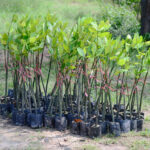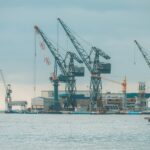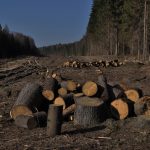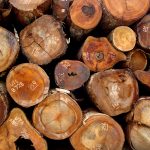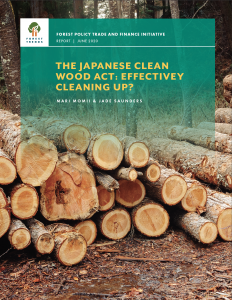
Subsidies for forest biomass energy in Japan and South Korea are contributing to deforestation in Southeast Asia, according to an October 2024 report by environmental NGOs. The biomass industry is expanding especially quickly in Indonesia; the nation is exporting rapidly growing volumes of wood pellets, and is burning biomass at its domestic power plants.
Japanese trading company Hanwa confirmed that rainforest is being cleared to establish an energy forest plantation for wood pellet production in Indonesia’s Sulawesi Island. Hanwa owns a stake in the project. The wood pellet mill uses cleared rainforest as a feedstock while the monoculture plantation is being established.
A Hanwa representative defended the Sulawesi biomass project by claiming the area consists of previously logged secondary growth and that the energy plantation concession is not officially classified as “forest area.”
As of June 2024, there were 6.73 million ha. of MTCSPEFC certified forests in 36 certified natural forest units (FMUs) and nine certified forest plantations (FPMUs). There were 362 companies holding MTCS-PEFC certificates for Chain of Custody. MTCC statistics show that in 2023
Japan maintained its position as the leading importer of timber products certified under MTCS, totaling 102,630 cu m. followed by the Netherlands with United Kingdom, Australia, Belgium and France among the top importers.
Total exports increased by 7.4 % from 244,946 cu m in 2022 to 264,240 cu m in 2023 with plywood, sawnwood and mouldings remaining the major exported certified products. MIS_16-31_July2024.pdf (itto.int)
The depletion of mangrove forests in Tanintharyi Region has constrained the illicit crossborder trade of charcoal into Thailand, even as prices remain high, but small-scale producers in Myanmar’s deep south have few other ways to make a living.
Myanmar charcoal accounts for more than two thirds of Thai imports of the commodity, with smaller quantities coming from Laos, Cambodia and Malaysia. While many households and businesses in Thailand have switched to cooking mostly with gas, using charcoal only for barbecues, Thai customs data suggests that almost 80 percent of charcoal imports are re-exported, to countries including China, Japan, Australia and Bahrain.
The preliminary results of the transaction verification (TV) loop on Vietnamese wood supply chains indicate that there are some potential discrepancies in transactions reported by the certificate holders included in this TV loop. Several suppliers declared fewer sales than the purchases reported by their customers.
The original scope of the TV loop included 424 certificate holders – 368 chain of custody and 56 forest management certificates; they were requested to submit their transaction data for 2022. However, 17 certificate holders did not respond, and their certificates were suspended by their respective certification bodies, some of which were subsequently terminated. Findings include:
- Some certificate holders sold products with FSC controlled wood claims to non-certified companies, which is against the normative provisions related to FSC controlled wood (FSC-STD-40-004-V1, clause 5.6).
- The volume of FSC controlled wood traded in the supply chains surpasses the volume of timber sourced from FSC-certified forests.
In wood product trade, Japan is one of the five biggest importers from the Vietnamese market in the world with roughly US$1.5 billion to US$2 billion each year.
During the course of a few days discussing and signing the Memorandum of Cooperation, Việt Nam shared information about the processing and trade of wood and wood products in Việt Nam, and regulations on the legality of wood to contribute to promoting legal wood production, sustainable export and trade of wood and wood pellets between the two countries.
Also reported here: Vietnam and Japan eye stronger forestry co-operation (vov.vn)
Russia is now facing a growing gap between timber production and log supply, with production growing 5% in 2024, while commercial logging of Russian forests has nose-dived 26%.
That is according to Lesprom’s “Russian Lumber Industry Insights,” which reports that Russian sawmills are now bleeding thanks to a critical shortage in raw materials and are struggling to meet rising demand from major export markets.
The problem for Russia is that Western Companies—which provided much of the foreign direct investment needed to modernise logging operations in the decades leading up to the 2022 war—have now exited the country on mass, creating large gaps in the Russian supply chain.
New research using Trase data shows that supply chain divergence to meet different consumer requirements already is a reality. Brazil’s exporters, for example, sell soy to Denmark and Norway that is four-times less exposed to deforestation than soy sent to China or used domestically.
The researchers interviewed companies from the Brazilian soy sector and confirmed such segmentation is both predictable and standard practice. While physical segregation of soy grains can be challenging, it has not been difficult for certain traders and regions exposed to very different levels of deforestation to specialise in markets that demand higher or lower levels of sustainability.
The global extraction of raw materials is expected to increase by 60% by 2060. The stripping of Earth’s natural materials is already responsible for 60% of global heating impacts, including land use change, 40% of air pollution impact, and more than 90% of global water stress and land-related biodiversity loss, says the report, due to be released in February.
Wilmar International’s No Deforestation, No Peat, No Exploitation policy, announced ten years ago, marked a significant milestone in environmental conservation by prohibiting deforestation, peatland destruction, land-grabbing, and labor abuses in their global supply chain, impacting thousands of palm oil companies.
The policy, a result of global campaigning and intense negotiations, contributed to a dramatic reduction in deforestation for palm oil by over 90%, influencing other industries and contributing to the lowest deforestation levels in Indonesia, as well as progress in Malaysia, Papua New Guinea, and tropical Africa, argues Glenn Hurowitz, the Founder and CEO of Mighty Earth, who led the negotiation with Wilmar.
Hurowitz says this “success story” highlights the importance of private sector involvement, effective campaigning, diligent implementation, the necessity of continuous effort, and the insufficiency of data alone in driving change.
Forests are shrinking across the globe. A primary cause is illegal logging. Japan, as a major consumer of timber, must make efforts to strengthen measures to eradicate this illicit practice.
In addition to housing, wood is used in various products ranging from furniture to paper. The use of timber has increased with the development of the global economy, and illegal logging has become conspicuous.
About 180 million hectares of forest were reportedly lost worldwide over the 30 years from 1990. This figure represents five times the area of Japan.
Forests absorb carbon dioxide. A decrease in forests could accelerate global warming. It is necessary to halt deforestation by preventing illegal logging.
Click here to access the Global Illegal Logging and Associated Trade (ILAT) Risk assessment tool and to download the Forest Trends User Guide describing the functionality of the ILAT Risk Data Tool.
Click here to access the Cattle Data Tool.



